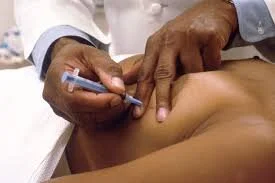Biopsy can be completed via fine needle aspiration (FNA), sonographically guided core biopsy, or excision. Excisional biopsy of cervical lymph nodes risks damage to the nearby spinal accessory nerves. FNA is a safe and efficient procedure for diagnosis of malignant cervical lymphadenopathy. It has lower risk than excisional biopsy for complications or unintended damage to nearby structures but has somewhat lower predictive accuracy for the existence of malignancy. However, the utility of FNA has increased in recent years as the technology has improved. FNA is expedient, low risk and has an extremely rapid turnaround--same day in many institutions. Patients should be referred to an otolaryngologist or head and neck surgeon for an excisional biopsy, due to the delicate nature of the area surrounding the cervical lymph nodes and risk of damage to nearby nerve structures.
Performing an excisional biopsy of a cervical lymph node is a delicate procedure that should only be undertaken by a physician who specializes in head and neck surgery because the cervical lymph nodes are situated so near to the spinal accessory nerve, which has a long and superficial course in the posterior cervical neck. The spinal accessory nerve innervates the trapezius muscle and the sternomastoid muscle, which control motions of the shoulder and neck, respectively.
Lymph node biopsy/fine needle aspiration (FNA) medical expert witness specialties include head and neck surgery, interventional radiology, surgical oncology, general surgery, breast surgery, otolaryngology, oncology, pathology, and radiology.

